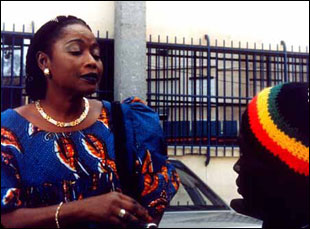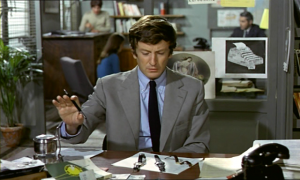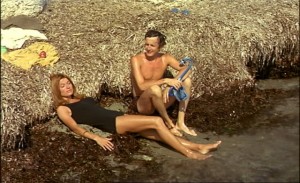The Film Center’s ongoing retrospective of the work of Italy’s greatest living filmmaker, Michelangelo Antonioni, offers two noteworthy programs this Friday night. First is perhaps the most unjustly neglected of Antonioni’s early features, Lady Without Camelias (La signora senza camelie, 1953), a caustic Cinderella story about a Milanese shop clerk (Lucia Bose) who briefly becomes a glamorous movie star. One of the cruelest and most accurate portraits of studio moviemaking and the Italian movie world that we have, it’s informed by a visually and emotionally complex mise en scene that juggles background with foreground elements in a choreographic style recalling Welles at times. Though it’s only Antonioni’s third feature, and it’s episodic structure necessitates a somewhat awkward expositional method, this is mature filmmaking that leaves an indelible aftertaste.
Then comes a program of shorts made between 1947 and 1953, mainly “apprentice” works, though no less impressive and commanding for all that; the only conventional and fairly forgettable one is the last in the program, The Villa of Monsters (1950)–to be shown, unlike the others, only with French and German subtitles. Perhaps the most significant stylistic trait to be found in most of the work here is the pan suddenly linking foreground with background, the animate with the inanimate. Read more
From Film Comment (January-February 2001). –- J.R.

I blush to admit that I’ve still seen only half the eight features to date of Ousmane Sembene, made over a 33-year period as a supplement to his dozen or so volumes of fiction. Yet considering how difficult it generally is to track his remarkable and varied work on film or video that comes ridiculously close to qualifying me as an expert. (The fact that it typically takes a couple of years for a new Sembene film to reach these shores is commonly perceived as an African as opposed to American form of inertia, but I would think the responsibility for this state of affairs might be shared.)
The first and in many ways still the greatest of all African filmmakers — give or take a masterpiece or two each by Yousef Chahine, Souleymane Cissé, and Djibril Diop Mambety, among others — Sembene, born into the Senegal working class in 1923, started out as a gifted novelist who turned to filmmaking at the age of 40 chiefly in order to address more Africans. Yet because he’s a storyteller who regards film more as an extension of his prose than as an abstract calling, one of the clearest pleasures to be derived from his work is his propensity for reinventing the cinema – his own and everyone else’s — every time he embarks on a new feature. Read more
Written for Kino Lorber’s Blu-Ray of the film, released on November 10, 2015. — J.R


Alain Resnais (1922-2014) was the most experimental and adventurous of all the French New Wave directors, but he has rarely been recognized as such, perhaps because he stood apart from his (mainly younger) colleagues in other respects as well. Unlike Godard, Rivette, Truffaut, Chabrol, and Rohmer, he wasn’t a critic or a writer, although as a teenager during the German Occupation of France he was already serving as a mentor to their own critical mentor, André Bazin, by introducing him to silent cinema in general and Fritz Lang in particular. He also preceded them all as a director in the eight remarkable non-fiction shorts he made between 1948 and 1958, the first of which (Van Gogh) won him his only Oscar. Indeed, the moment one compares these innovative shorts to the early sketches of Godard, Rivette, et al., the clearer it becomes that Resnais was already a courageous radical, both formally and politically, long before such a position even occurred to his colleagues. And one could argue that he was also already a film critic and film historian on his own elected turf, namely sound and image, even if he didn’t exhibit his exquisite cinematic taste in writing. Read more



